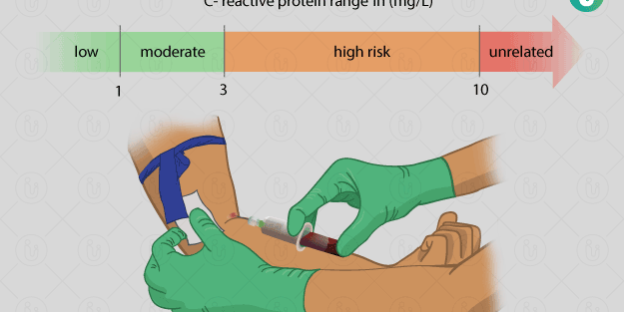What Is The C – Reactive Protein Test?
The C- reactive protein test measures the C-reactive protein substance level in the blood, which is produced from the liver as a result of inflammation. The test is conducted to determine acute and chronic conditions causing the inflammation such as rheumatoid arthritis or lupus or heart disease. Depending on the inflammation, CRP level in the blood can rise and fall. Hence, low level of CRP in the blood means that the treatment prescribed for inflammation has worked.
C- REACTIVE PROTEIN AND HEART DISEASE
A high sensitivity C- reactive protein test can be conducted to determine heart diseases. HS CRP Test is usually more sensitive than a standard CRP test which analyzes the risk of coronary artery disease. It is a disease in which heart arteries are narrowed which can further lead to heart attack. Therefore, people with CRP levels over 2 milligram per liter needs treatment and management more intensely.
What Are The Symptoms Of C – Reactive Protein?
A C –reactive protein test should be conducted when following symptoms occur:
- Fever
- Nausea or vomiting
- Headache
- Muscle stiffness or weakness
- Loss of appetite
- Chills
- Rapid heart rate
- Fast breathing
- Insomnia
- Weight loss
What Is The Meaning Of The Test Results?
Generally, C-reactive protein is measured in milligram per liter. However, the test results may show readings higher than normal due to a number of things like smoking, obesity, diabetes and lack of exercising.
- Less than 1 milligram of CPR per liter means there’s a lower risk of cardiovascular disease.
- Between 1 and 2.9 milligram of CPR per liter indicates intermediate risk.
- More than 3 milligram of CPR per liter means there’s a high risk of cardiovascular disease.
- More than 10 milligram of CPR per liter signals the requirement for further testing to determine the actual cause of the inflammation in the body. this high level of CPR may indicate:
- Osteomyelitis
- Tuberculosis
- IBD
- An autoimmune arthritis
- Pneumonia
- Lupus
- Cancer, lymphoma specifically
A CRP does not reveal the location or cause of the inflammation. Therefore, if the test results are not normal, the doctor might ask you to take other tests in order to figure out the reason of the inflammation.
FACTORS CHALLENGING THE INTERPETATION OF TEST RESULTS
Following factors can also contribute in making it challenging to interpret the test results:
- MEDICATIONS: Cholesterol reducing medicines and other inflammation reducing medicines can lower the CRP level.
- PREGNANCY:Pregnancy can cause elevation in the CRP level, especially during the last months.
- MINOR INJURIES:Minor infections or injuries might elevate CRP level temporarily.
- ESTORGEN LEVELS: Birth control pills, hormone replacement pills and other estrogen based medications may raise the level of CRP in the blood.
If you feel any of the symptoms mentioned above, perform a CRP test in Gujrat. Moreover, best CRP lab Gujrat conducts lab tests in the cleanest and safest way. For accurate and authentic results, concern CRP test lab Gujrat.




